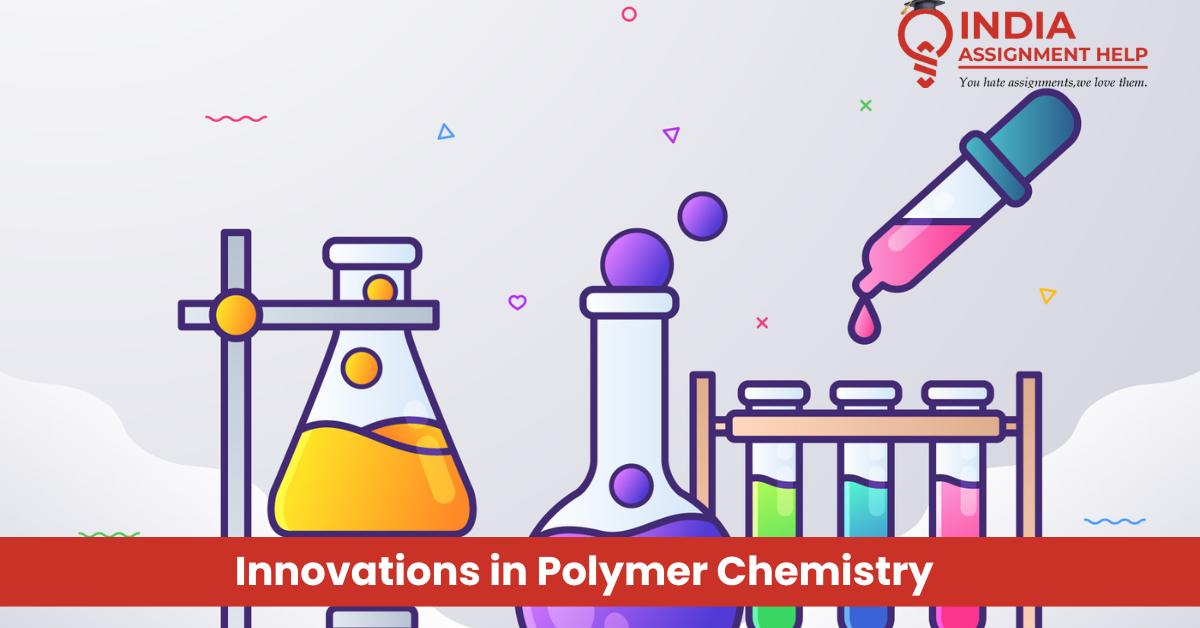Innovations in Polymer Chemistry

Polymer chemistry is still the foundation of contemporary science, engineering materials and technologies that underpin today's lifeworld. The primary objective of the work is the macromolecular analysis, i.e., constituting repeating units called monomers made into polymers with defined properties and activities. As students delve into this intricate field, they often encounter challenges that make seeking Polymer Chemistry assignment help essential to academic success.
What Is Polymer Chemistry?
Polymer chemistry is part of the chemistry that strives to explain polymers—the macromolecules that serve as building blocks of materials, e.g., plastics, rubbers, fibres, etc. The research covers polymers' synthesis, structure, and application and acts as a springboard for advances in the biomedical sciences and electronics. Polymers are in nature, e.g., cellulose and proteins or in nature, e.g., polystyrene and nylon. The field’s complexity often poses challenges to students. A Polymer Chemistry assignment writer can simplify these intricate concepts, ensuring assignment clarity and precision.
Types of Polymers
Polymers are generally natural and synthetic, with specific properties and applications. Natural polymers, i.e., DNA and rubber, produced by natural sources, play a pivotal role in life activities. Polyethylene, polyvinyl chloride (PVC) and Teflon are fabricated for various industrial uses. The molecular characterisation of polymers relies upon an understanding of their macromolecular structure and properties. Simultaneously, while students must achieve, for example, high results on a Polymer Chemistry assignment, they frequently have to ask for help and decide on a course of action with a Do My Polymer Chemistry assignment service.
The Chemistry of Polymerization
Addition Polymerization: Monomers possessing double or triple bonds polymerise to form long chains without byproducts. Examples include the production of polyethene and polypropylene.
Condensation Polymerization: In this step, small molecules (water or methanol) are desolvated in the polymerisation reaction. It certainly is common in the production of polyesters and polyamides.
Assignments in polymerisation are often needed to emphasise a better understanding of reaction schemes. As an example of the importance of accessing this type of support in preparation for BME, requesting help with Polymer Chemistry homework help presents a comprehensive description and realistic illustrations of how these processes work.
Applications of Polymers in Daily Life
Polymers play a pivotal role in shaping modern life. Its applications span the industry, including packaging, health, construction, and electronics. For instance, polyethene is frequently used for packaging due to its flexibility and rigidity, while polytetrafluoroethylene (PTFE), also known as Teflon, is considered non-stick. Polylactic acid (PLA), in particular, is of growing interest because of its biodegradability and is, therefore, suitable as building blocks for green, sustainable packaging technology. If assignments involve the applications of polymers, almost it will be necessary to provide examples (i.e., for analytical purposes or practical cases). A pay-for-service assignment for polymer chemistry can be used to write original works on this topic.
Innovations in Polymer Chemistry
The polymer chemistry community continually grows with demand for functional, sustainable, high-performance materials. There is an emphasis on biodegradable polymers to overcome environmental challenges, and smart polymers are being developed for functional applications (e.g., drug delivery systems) in advanced biomedical fields. The authors write that research is to be furthered to stay abreast of these advances. Professional Polymer Chemistry assignment experts can provide insights into cutting-edge developments, ensuring relevant and insightful assignments.
Challenges Faced by Students
Polymer chemistry is an interdisciplinary science involving organic, physical, and material science. In this level of complexity, it is practically impossible for students to understand those concepts, e.g., molecular weight distribution polymerisation kinetics or characterisation methods. Writing assignments on such topics demands precision and clarity. Consulting a Polymer Chemistry assignment service ensures that students receive expert guidance and produce assignments that meet academic standards.
Characterisation of Polymers
Polymer characterisation includes the determination of the physical, chemical and mechanical properties. Spectroscopy, chromatography, and rheology are conventional techniques for determining molecular weight, thermal stability, and mechanical strength. In polymer characterisation tasks, the analysis and drawing of inferences from experimental data could be a significant part of the task. Through an assignment in Polymer Chemistry, the student can correctly interpret the results and provide a comprehensive discussion presentation.
Conclusion
The science and innovation of polymer chemistry is a continuously developing and significant field. Nonetheless, expert involvement may be required to succeed because of the complexity. Submitting a student's work and assignment helps in Polymer Chemistry, which gives students access to the information and the means to reach academic success to the best of their abilities. Visit India Assignment Help now to get personalised assistance and meet your educational objectives in polymer chemistry.
FAQs
Q1. What are polymers, and why are they important?
A1. Polymers are large molecules composed of repeating units (monomers). They have a crucial and direct role in the evolution of the materials (i.e., plastics, rubbers, fibres) that sustain contemporary society.
Q2. How can assignment help services assist with polymer chemistry?
A2. Assignment help services offer the best possible support, thorough research, and thoughtful answers through which high-quality work can be produced.
Q3. What are some common applications of polymers?
A3. Polymers are used for packaging, construction, health, electronics and many other applications, emphasising their general potential and importance.
Q4. Why is polymer chemistry considered challenging?
A4. It is a complicated topic because of its multidisciplinary nature, which comes from organic chemistry, the science of materials, and physical chemistry.





